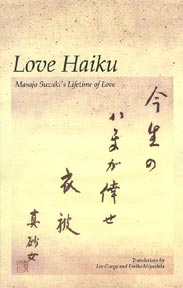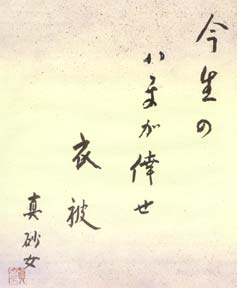Love Haiku: Masajo Suzuki's Lifetime of Lovetranslated by Emiko Miyashita & Lee Gurga |
|
|
Masajo Suzuki. Love Haiku: Masajo Suzuki's
Lifetime of Love © August, 2000. Perfect Bound, (5.5"
X 8.5") 112 pages. Brooks Books is pleased to offer this selection of a contemporary haiku writer's lifetime work in haiku. Please join us in the celebration of Love Haiku: Masajo Suzuki's Lifetime of Love edited and translated by Lee Gurga and Emiko Miyashita, a translation team which combines the talents of two of our leading contemporary haiku poets in the United States and Japan. This book includes the best love haiku by Masajo, published in a dual-language edition with notes from the author as well as from the translators. firefly
light: Masajo Suzuki followed her own path. She is not just a love poet in the sense of writing about her lover, but a love poet in the larger sense of loving life and living it fully. |
|
|
|
|
|
Comments from previous reviews and editors:"Although Masajo writes with exquisite objective imagery it is dyed in her feelings, as if she is writing on white paper that has been soaked in hues of red." —Patricia Donegan, from the introduction "Writing exquisitely, Masajo Suzuki fuses her seasonal perceptions with deeply honest haiku that capture the enduring poignancy of a great love. These poems get under the skin. In careful and sensitive translations, Lee Gurga and Emiko Miyashita bring the full range of emotion and sensuality in Masajo's lifework across the distance and into our hearts." —Penny Harter, co-author, The Haiku Handbook |
Other sources of Masajo Suzuki's haiku include:Aoki Seiichirô, Suzuki Masajo Dokuhon, Tokyo: Kadokawa Shoten, 1996 Hoshiya Toyomi, Itsumademo Masajo, Tokyo: KSS Shuppan, 1998 Kuroda Momoko, Haiku to Deau, Tokyo: Shôgakkan, 1997 Masaki Yûko, Okite Tatte Fuku wo Kirukoto, Tokyo: Shin'yasôshosha, 1999 Suzuki Masajo, Unami, Tokyo: Yûshorin, 1961 Suzuki Masajo, Miyakodori, Tokyo: Kadokawa Shoten, 1994 Suzuki Masajo, Oinarisan no Roji, Tokyo: Fujimishobô, 1994 Suzuki Masajo, Masajo Saijiki, Tokyo: PHP Kenkyûjo, 1998 Suzuki Masajo, Hito Kanashimasu Koi wo Shite, Tokyo: Kadokawa Shoten, 1998 Suzuki Masajo, Shimokuren, Tokyo: Kadokawa Shoten, 1998 |
|
"Inspired by a love story we heard at the Haiku North America conference at Evanston, Illinois in the summer of 1999, we began translating Masajo's haiku. This book contains 150 love haiku selected from the 2,576 haiku in her seven haiku books published between 1955 and 1998. We hope they will touch your hearts as they have touched ours." Lee Gurga & Emiko Miyashita |
|
About the Translators:Lee Gurga was born and raised in Chicago, Illinois. Past president of the Haiku Society of America and currently associate editor of Modern Haiku, his haiku have won the top prize in haiku contests in the United States, Canada, and Japan. His books of English-language haiku, In and Out of Fog and Fresh Scent, both received the first prize in the Haiku Society of America Merit Book Awards. He was awarded an Illinois Arts Council Poetry Fellowship in 1998 for his work in haiku. He is currently a small town dentist in the farming community of Lincoln, Illinois, where he lives with his wife Jan and sons Ben, A.J., and Alex. |
Emiko Miyashita was born in Japan in 1954. She met Dr. Akito Arima, her future haiku master, on the Hikawamaru, a ship crossing the Pacific, in 1959. Her father, Dr. Kazumori Minami, and Dr. Arima were both Fulbright grant lecturers heading to Urbana and Chicago respectively. She graduated from Doshisha University in Kyoto in 1978. She is a Dojin (leading member) of the Ten'i (Heaven's Work) haiku group, a member of the Haiku International Association and the Haiku Society of America. |

 About the Author
About the Author From
the Introduction
From
the Introduction